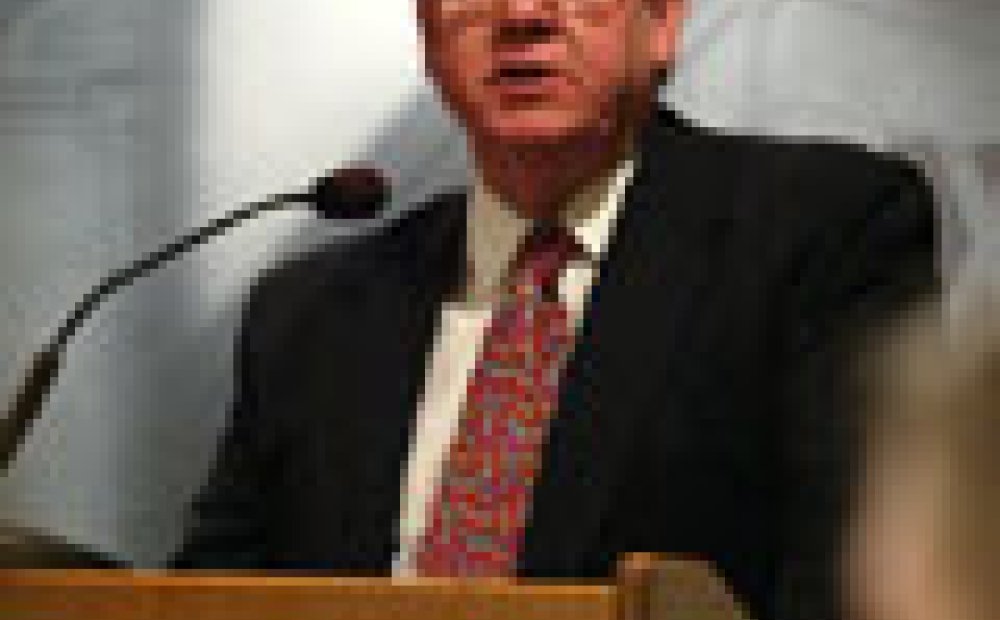A South African Perspective on Zimbabwe and Southern Africa

Soal offered a South African perspective on the deepening Zimbabwe political and economic crisis.
Soal outlined the dismal economic situation confronting Zimbabweans. Once considered the “breadbasket of Africa”, Zimbabwe’s GDP has dropped 35% in four years. A collapsed Zimbabwean dollar, falling exports and imports, lack of necessary fuel, and severe unemployment are but a few of the indicators of Zimbabwe’s economic distress. “What was a prosperous country some years ago has been brought to the brink of bankruptcy by corruption and mismanagement.”
Soal described other measures of Zimbabwe’s social deterioration. With the second highest ratio of HIV/AIDS infection in Africa – trailing only Botswana -- 34% of all Zimbabwean adults test positive and 3000 people die each week. In some parts of the country, infant mortality is up to 50% under age five. Medical facilities face severe shortages of both supplies and trained personnel, many of Zimbabwe’s professionals having fled the country. It is estimated that one-third of the Zimbabwean population are now economic refugees. Obviously, the impact of all of this is felt dramatically in South Africa, where over 2 million Zimbabwe migrants are present, with an estimated 1,500 new migrants arriving daily.
Soal indicated that the current official opposition political party, the Movement for Democratic Change (MDC), has greatly strengthened its position in recent months through its coalition with civic and labor groups. However, Soal noted MDC members and supporters continue to be harassed and intimidated through beatings, torture and killings. Soal remarked on the relative silence from the African Heads of State, noting the long-standing solidarity of African leaders in the face of international pressure. In this connection, he referred to South Africa’s isolation several years ago, when President Mandela, reacting to the execution of a Nigerian poet by the Abacha regime, sought the expulsion of Nigeria from the Commonwealth .
Countering the reluctance of African leaders to break ranks, there is a growing recognition that the situation in Zimbabwe is likely to have a very negative impact on the viability of the New Program For African Development (NEPAD), in which Africa has placed a great deal of hope for its economic future. As the creation of South African President Thabo Mbeki and Nigerian President Olusegun Obasanjo, NEPAD has become the yardstick by which future investment in Africa may be measured, and the Zimbabwean crisis may undermine the credibility of NEPAD unless “its peer review mechanism is used effectively to deal with Mugabe.” That is why, Soal indicated, that Mbeki has again traveled to Harare, with the Presidents of Nigeria and Malawi, in the most recent attempt to secure a negotiated settlement of the internal Zimbabwean conflict.
Notwithstanding the dismal situation Zimbabweans face, Soal said there was a glimmer of hope in recent events. Mugabe himself had recently stated publicly that, with his land distribution goals having been accomplished, he could now consider retirement. Moreover, there are some reports coming out of Harare suggesting that the three African Presidents may have produced some modest progress in establishing the conditions for a negotiated agreement between Mugabe’s ruling party, the ZANU-PF and the opposition MDC. It appeared that the MDC and elements of ZANU-PF were exploring ways to let Mugabe step aside without losing face, possibly through a coalition interim government and consensus interim President that would provide the time and political space required to amend the constitution and set the stage for a new presidential election in 2005. In that connection, Soal noted that there was a press report characterizing MDC leader Morton Tsvangirai as very “upbeat” about the recent Mbeki-led intervention by African Heads of State. This report was significant, in Soal’s view, given the previously very cool relationship between Mbeki and Tsvangarai.
Hosted By

Africa Program
The Africa Program works to address the most critical issues facing Africa and US-Africa relations, build mutually beneficial US-Africa relations, and enhance knowledge and understanding about Africa in the United States. The Program achieves its mission through in-depth research and analyses, public discussion, working groups, and briefings that bring together policymakers, practitioners, and subject matter experts to analyze and offer practical options for tackling key challenges in Africa and in US-Africa relations. Read more
